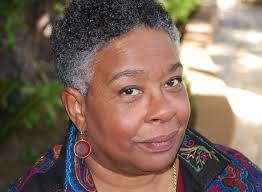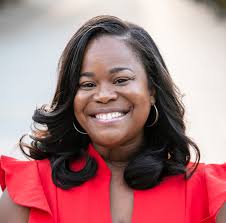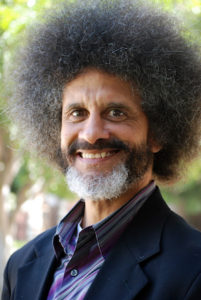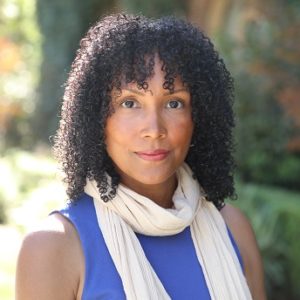Contact: Jenesse Miller 213-810-8554 or jenessem@usc.edu
What the vote means to African Americans
 “Black History Month’s theme in 2020, ‘African Americans and the Vote,’ recognizes the long and ongoing struggle of black Americans to exercise their rights as citizens including voting, testifying in court and serving on juries. It also marks the sesquicentennial of the 15th Amendment, the centennial of the 19th Amendment and 55 years since the passage of the Voting Rights Act.
“Black History Month’s theme in 2020, ‘African Americans and the Vote,’ recognizes the long and ongoing struggle of black Americans to exercise their rights as citizens including voting, testifying in court and serving on juries. It also marks the sesquicentennial of the 15th Amendment, the centennial of the 19th Amendment and 55 years since the passage of the Voting Rights Act.
“Today, the theme is particularly timely as African Americans face voter suppression laws in more than 30 states that are aimed at black voters as well as women, the poor, rural and elderly voters. Black History Month was launched nationwide in 1926 as Negro History Week by Dr. Carter G. Woodson, founder of the Association for the Study of African American Life and History (ASALH) which continues to set the annual black history theme. In Los Angeles, the local branch of ASALH, Our Authors Study Club, has led the city’s official recognition of the black history month since the 1950s.”
Francille Rusan Wilson‘s research examines the intersections between black labor movements, black social scientists, and black women’s history during the Jim Crow era. She is an associate professor of American Studies and Ethnicity, History, Gender & Sexuality Studies at the USC Dornsife College of Letters, Arts and Sciences and the immediate past president of the Association of Black Women Historians.
Contact: frwilson@usc.edu or (213) 740-2426
Who documents African American history?
 “I’m fascinated by how African Americans are using their smartphones and social media to produce innovative forms of journalism and share their truths. It’s a continuation of this very long work of bearing witness in three overlapping eras of domestic terror: slavery, the fight for civil rights, and police brutality and mass incarceration.
“I’m fascinated by how African Americans are using their smartphones and social media to produce innovative forms of journalism and share their truths. It’s a continuation of this very long work of bearing witness in three overlapping eras of domestic terror: slavery, the fight for civil rights, and police brutality and mass incarceration.
“Throughout those three periods, there were always African American witnesses using the technology of their time. That includes today’s mobile journalist-activists who documented the Black Lives Matter movement using only their smartphones and Twitter.”
 “More than stiff drug laws, punitive judges, overzealous cops or private prisons, prosecutors had been the main drivers of a prison population that had quadrupled since the mid-1980s. Meanwhile, black Americans continued to be disproportionately incarcerated. In 2017, there were 1,549 black prisoners for every 100,000 black adults.
“More than stiff drug laws, punitive judges, overzealous cops or private prisons, prosecutors had been the main drivers of a prison population that had quadrupled since the mid-1980s. Meanwhile, black Americans continued to be disproportionately incarcerated. In 2017, there were 1,549 black prisoners for every 100,000 black adults.
“This prosecutorial approach wasn’t punished at the ballot box; instead, racking up convictions and plea deals seemed to bolster the political careers of district attorneys.
“But in one of the most stunning shifts in American politics in recent memory, a wave of elected prosecutors have bucked a decadeslong tough-on-crime approach adopted by both major parties.”
Jody Armour studies the intersection of race and legal decision making as well as torts and tort reform movements as the Roy P. Crocker Professor of Law at USC Gould School of Law. Armour’s comments are excerpted from his recent piece for The Conversation, “How being tough on crime became a political liability.” He recently co-hosted a Facebook Live broadcast with Allissa Richardson, assistant professor of communication and journalism at the USC Annenberg School.
Contact: armour@law.usc.edu or (213) 740-2559
Who’s paying lip service to Black History?
 “For those of us in the trenches of Black Studies and social justice, every month is Black History Month. However, every year folks who are not routinely attuned to the socio-political issues African Americans face can come off as paying lip service during February.
“For those of us in the trenches of Black Studies and social justice, every month is Black History Month. However, every year folks who are not routinely attuned to the socio-political issues African Americans face can come off as paying lip service during February.
“For example, the month opened with President Trump and Democratic presidential candidate Michael Bloomberg airing Super Bowl ads featuring black women in a transparent attempt to attract this coveted and significant voting bloc. The criticism their ads faced perhaps signals a broader lesson not only for those seeking the presidency, but for all voicing support for black issues during the month of February: True advocacy for African Americans can neither be enacted in 60-second commercials nor within the confines of the year’s shortest month.”
Oneka LaBennett is an associate professor of American Studies and Ethnicity at the USC Dornsife College and the author of She’s Mad Real: Popular Culture and West Indian Girls in Brooklyn, and editor of Racial Formation in the Twenty-First Century.
Contact: oneka.labennett@usc.edu
Today, the departments of American Studies and Ethnicity and Political Science are co-sponsoring a lecture by guest speaker Fordham University associate professor Christina Greer entitled, “Black Women are the Keepers of Democracy and the Democratic Party.” For more information contact aseinfo@dornsife.usc.edu.
For more Black History Month events at USC, visit the USC Events Calendar.
###
 “Black History Month’s theme in 2020, ‘African Americans and the Vote,’ recognizes the long and ongoing struggle of black Americans to exercise their rights as citizens including voting, testifying in court and serving on juries. It also marks the sesquicentennial of the 15th Amendment, the centennial of the 19th Amendment and 55 years since the passage of the Voting Rights Act.
“Black History Month’s theme in 2020, ‘African Americans and the Vote,’ recognizes the long and ongoing struggle of black Americans to exercise their rights as citizens including voting, testifying in court and serving on juries. It also marks the sesquicentennial of the 15th Amendment, the centennial of the 19th Amendment and 55 years since the passage of the Voting Rights Act. “I’m fascinated by how African Americans are using their smartphones and social media to produce innovative forms of journalism and share their truths. It’s a continuation of this very long work of bearing witness in three overlapping eras of domestic terror: slavery, the fight for civil rights, and police brutality and mass incarceration.
“I’m fascinated by how African Americans are using their smartphones and social media to produce innovative forms of journalism and share their truths. It’s a continuation of this very long work of bearing witness in three overlapping eras of domestic terror: slavery, the fight for civil rights, and police brutality and mass incarceration.




